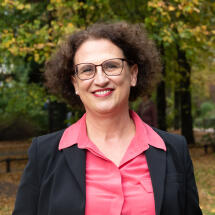Vita
Cecilia Cristellon (PhD, European University Institute, 2005, Italian habilitation in early modern history in 2012 and 2018), after having worked as a research fellow at the Institute for European History in Mainz, the Universities of Pisa and Münster, the German Historical Institute in Rome, the Newberry Library in Chicago and the Max Weber Foundation, she was a research fellow at the University of Frankfurt, the Institute for Advanced Studies at the University of Konstanz, and the Max Planck Institute for the History of Law in Frankfurt. She has taught at the Universities of Basel and Frankfurt, where she substituted for the Chair of Modern History in the 2024 summer semester. She is a member of the POLY research project “Policentricity and Plurality of Premodern Christianities. Her research has focused on ecclesiastical courts, book censorship, the social use of ecclesiastical spaces and interreligious and interdenominational relations - especially mixed marriages - in the politics of the Roman Congregations (especially the Inquisition, the Congregation of the Council and the propaganda of Fide).
Research Project
Negotiating Confession in Early Modern Europe: Roman Congregations, Mixed Marriages, and Administering Religious Plurality in an Entangled World (16th–18th Centuries)
My project studies the politics of the Roman congregations – in particular, the Roman Inquisition – towards marriages between members of different denominations and religions in Early Modern Europe. It analyses the means the Roman Curia used to deal with religious and legal pluralism, while trying at the same time to achieve a standardized law that would regulate them. Based mainly on records of Vatican archives that have been unexplored until now, the project takes mixed marriages as a key for studying the dynamic tension between legal unity and pluralism seen in efforts to cope with everyday religious contacts and conflicts. The normativity about mixed marriages produced by the Roman congregations was not an order imposed from above but rather a system that emerged from continual negotiation (between mixed couples and their families, between different churches in partibus, local authorities, and Roman congregations and their members) about actual cases. The decisions taken by Roman congregations to resolve a given case became the legal basis on which subsequent resolution would be made by the same authorities. This confrontational negotiation led to a continual process of revision and overcoming differences between a normative ideal (the uniformity of law and religion ) and a factual reality (legal and religious plurality).
Selected Publications
Cristellon, Cecilia, Choosing Information, Selecting Truth. The Roman Congregations, the Benedictine Declaration, and the Establishment of Religious Plurality, in: Badea, Andreea/ Boute, Bruno/ Cavarzere, Marco (Ed.), Making Truth in Early Modern Catholicism, Amsterdam 2021, 279–303.
Cristellon, Cecilia, The Senses in Court. Performativity, Proof, and Expertise in the Renaissance and in the Early Modern Period, in: Werkstatt Geschichte 83/ 1 (2021), 17–35.
Cristellon, Cecilia, (2020), Religion, in: Ferraro, Joanne M. (Ed.), A Cultural History of Marriage, vol. 3, London/ New York 2020, 35–50.
Cristellon, Cecilia/ Schorn-Schütte, Luise (Ed.), Grundrechte und Religion im Europa der Frühen Neuzeit (16.–18. Jh.) Göttingen 2019.
Cristellon, Cecilia, Between Sacrament, Sin and Crime. Mixed Marriages and the Roman Church in Early Modern Europe, in: Gender and History 3 (2017), 605–621.
Cristellon, Cecilia, Marriage. The Church and its Judges in Renaissance Venice (1420–1545), London 2017.


